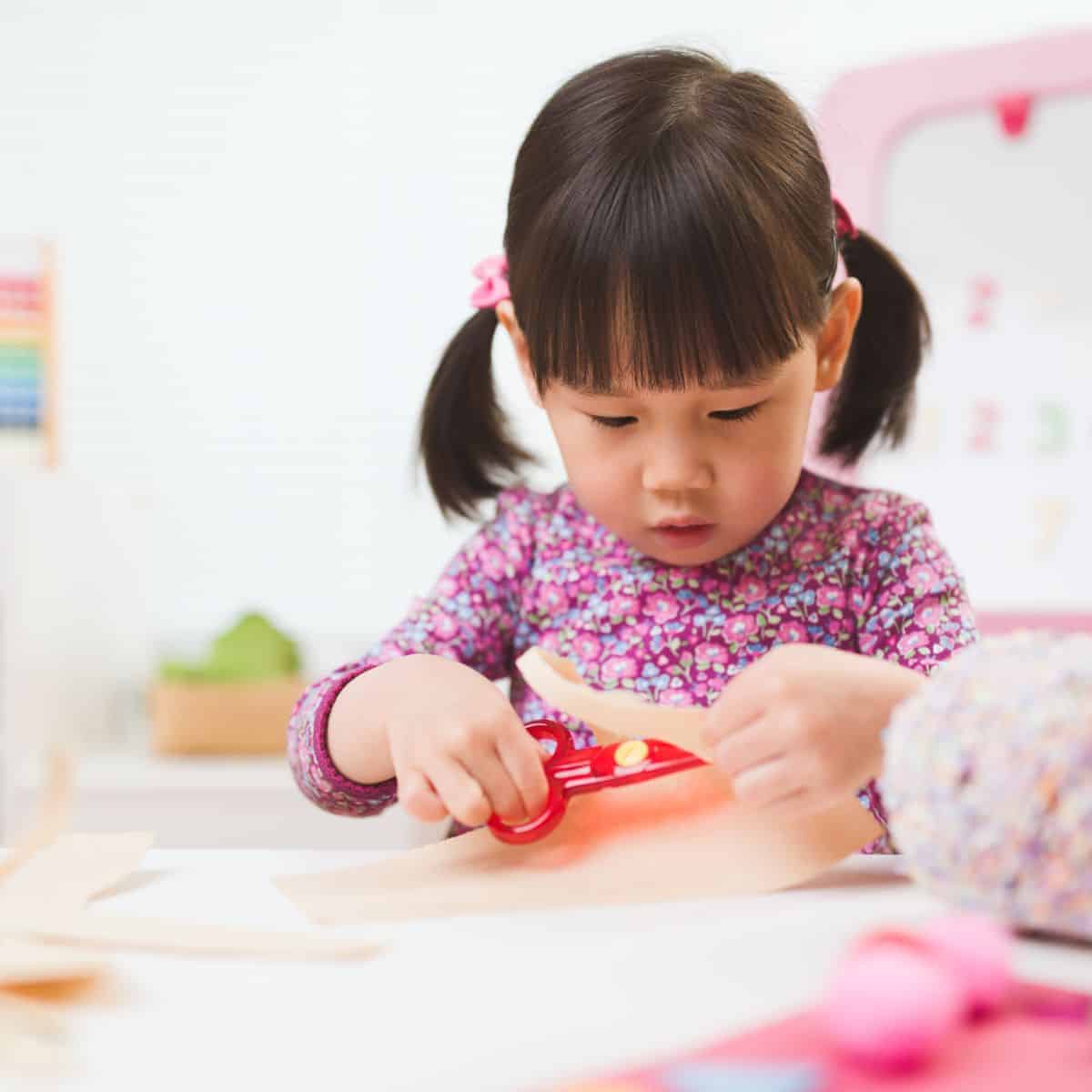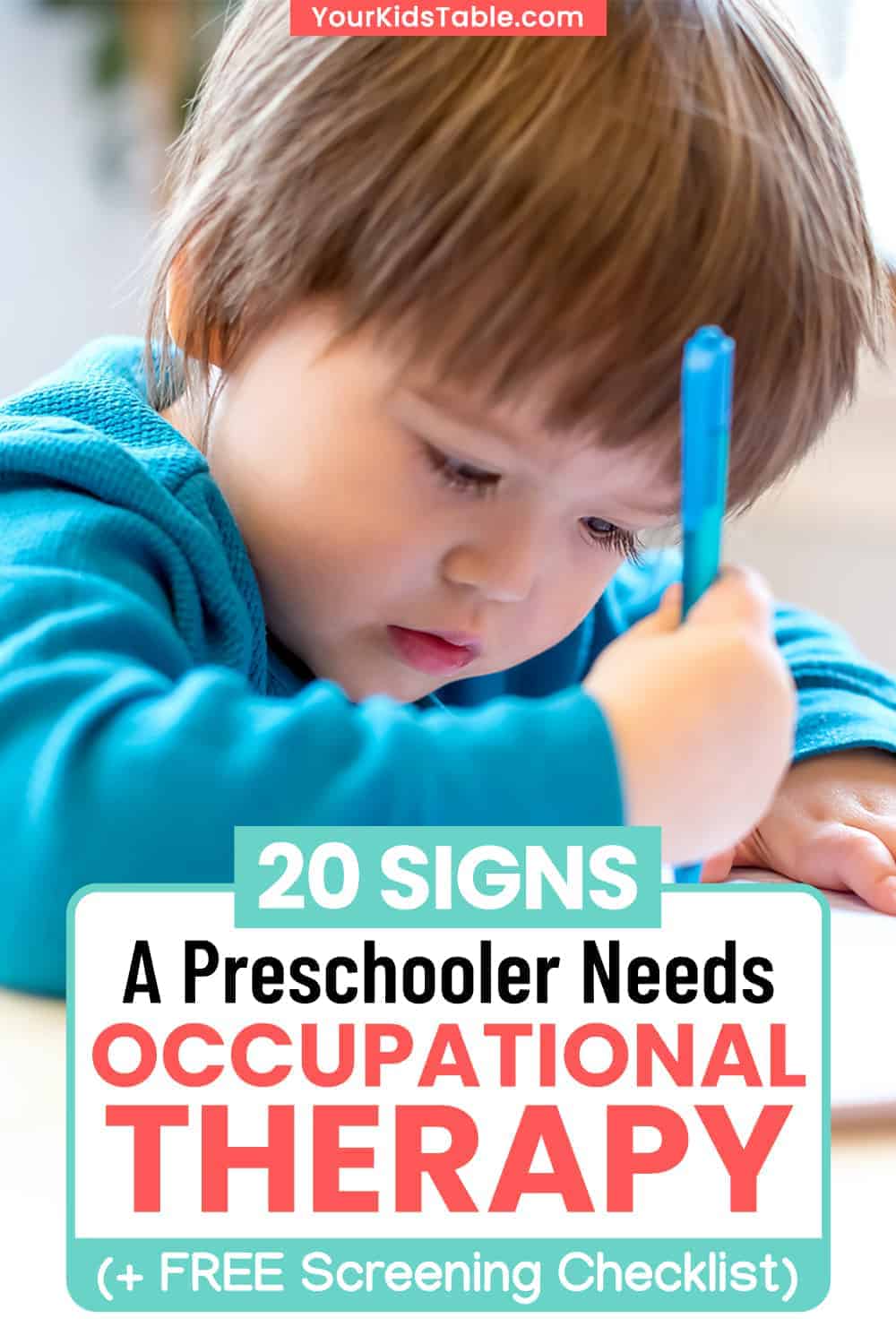Occupational therapists can help preschoolers with 7 different areas of development. Find out the 20 signs that your child might need OT in the preschool years…
How are things going at preschool?
Do you have a 3, 4 or 5 year-old at home?
Do you know if your child is ready for kindergarten?
The preschool years are an especially exciting time for your child to develop many new and wonderful abilities. The years between toddler hood and kindergarten are a time for building confidence while learning how to become more independent at home, school, and the community.
Did you know that the infant through preschool years are considered a “sensitive period” or “critical period” in a child’s early development?
The neurological foundations for learning are being set up during this important window of brain development and growth during the preschool years.
For children who need some help getting ready for kindergarten, occupational therapy lends a unique, developmental perspective to help build specific sensory motor skills that will help set kids up for success in the classroom.
Jessica McMurdie OTR.L, pediatric occupational therapist, mother of two, and founder of Play It Forward Therapy is sharing her expert advice from 20+ years of working with children and collaborating with parents and teachers with us on Your Kid’s Table.
Jessica believes in “paying it forward” by sharing unique occupational therapy activities to support child development and to help kids reach their potential. She’s sharing 7 critical skills preschoolers need…
How Occupational Therapy (OT) Can Help Boost Your Preschooler Child’s Development…
Occupational therapists help children learn how to play with confidence, while teaching important kindergarten readiness skills.
OTs help preschoolers get ready for kindergarten by helping them build important motor, sensory processing, prewriting, self-care, executive functioning, play, and social skills.
The best pediatric practitioners know how to boost your child’s development through playful practice using games, books, pretend play, and fun ways to exercise to help your child get stronger. And, the best part is, all of this “work” happens through play!
OT looks at the whole child, therefore, you’ll notice several areas to consider for helping your child prepare for a successful kindergarten year.

7 Developmental Areas That Occupational Therapy Can Improve
Occupational therapist work on a variety of different areas of development, knowing how they can support your child is important so that you can make sure any areas of need are addressed:
Area #1: Motor coordination
Gross motor skills include running, jumping, or navigating play equipment on the playground or at recess.
Area #2: Fine motor coordination
Hand dexterity is essential for coloring, cutting, writing and drawing.
Area #3. Sensory processing and self-regulation
It’s important to learn how to recognize how your child responds to certain sensory inputs. Understanding the triggers for maladaptive behaviors is the first step in identifying if your child has sensory processing challenges or sensory processing disorder. Occupational therapy can help you and your child discover the sensory tools to help your child achieve a calm body and mind. Learn What Every Parent Should Know About Sensory Processing Disorder
Area #4: Emotional control
Learning how to express and manage big feelings in a healthy way. Helping to support your child’s mental health.
Area #5: Social skills:
Learning how to share, take turns, and play cooperatively with other children, forming friendships by learning how to make friends and keep friends.
Area #6: Self-care skills
Becoming more independent with getting dressed, brushing teeth, eating a variety of foods, using utensils, and managing clothing fasteners.
Area #7: Executive Functioning Skills
Higher level cognitive skills necessary for success in the classroom such as sustained attention, direction following, frustration tolerance, and transitioning smoothly from one activity to the next. Discover a Sensory Guide for Student Success.
The primary goal of Occupational Therapy is to find ways to help your child be more successful, so if you think there’s a problem, my advice to you is…Don’t wait!
Early intervention Prevents further delays in development.
When preschoolers tend to avoid certain activities or lack the confidence to try new activities, especially related to the skills listed below, getting help sooner than later can prevent further delays in development throughout their childhood.
It’s important to keep in mind that kids can be perfectly healthy, yet not be on track developmentally. If someone tells you to wait or that he or she will grow out of it, this is not always the case.

20 Signs Preschoolers Might Need Occupational Therapy
If you’re wondering if your preschooler is on track when it comes to developmental milestones, The Preschool OT Screening Checklist is a general, yet well-rounded, checklist that represents the most common issues and challenges that arise in preschool aged children.
You can sign up for a copy of this checklist and use it as a conversation starter to share with your child’s preschool teachers too. (See the link to get the printable version of this list below).
If you find that your child is experiencing a few of the challenges outlined below, at home or preschool, then it’s important to bring up your concerns with your child’s primary care provider or pediatrician and have them evaluated by a pediatric occupational therapist.
The Preschool OT Screening Checklist
- Says “I can’t” or “I won’t” to age-appropriate activities
- Needs more practice than other children to learn new skills
- Clumsy, falls frequently
- Low muscle tone; seems weak or floppy
- Bumps into furniture or people, has trouble judging body in relation to space around him/her
- Dislikes coloring in lines, doing puzzles or cutting with scissors
- Overly active, unable to slow down
- Short attention span. Moves quickly from one toy to another.
- Delayed language development
- Difficulty self-calming
- Doesn’t notice or over-reacts to touch, taste, sounds, or smells
- Dislikes bathing, cuddling, or haircuts
- Very picky eater. Eliminates eating whole food groups.
- Has difficulty handling unexpected changes and transitions
- Difficulty following 1 to 2 step directions
- Avoids playground activities. Prefers sedentary play.
- Does not enjoy jumping, swings or having feet off the ground
- Finds it difficult to make friends with children of the same age.
- Prefers to play with adults or younger children rather than peers
- Easily frustrated or lacks confidence to try new things
I hope that you will find this checklist helpful for bringing up any areas of concern. Whether you use it for discussion with your pediatrician, teacher, or therapist, you’ll find it to be a helpful resource to get the conversation started. Remember, you know your child best, so follow your gut if you think your child may need a developmental boost.
If you’re a parent and ready for this next step, I encourage you to contact your home school, ask your pediatrician for local referrals.
CLICK HERE to Grab your FREE copy of the Preschool OT Screening Checklist
Looking for more for more OT Tested and Kid Approved activities? Visit our website or social media!
Play It Forward Therapy
Instagram
Facebook
YouTube
Jessica McMurdie OTR/L has helped thousands of children and parents over her 20+ year career as a clinician and clinic owner at Stepping Stones Therapy Network in Bellevue, WA. Jessica also understands the joy and challenges of being a parent and loves to consult with parents via telehealth sessions or in person at her practice in Washington state. Jessica also teaches other occupational therapists with her online courses centered around pediatric OT as well as coaching for starting and building a private practice. To learn more about Jessica and her consultation services you can click here

Thank you for the valuable content. May I share some of the content with the parents of my learning centre?